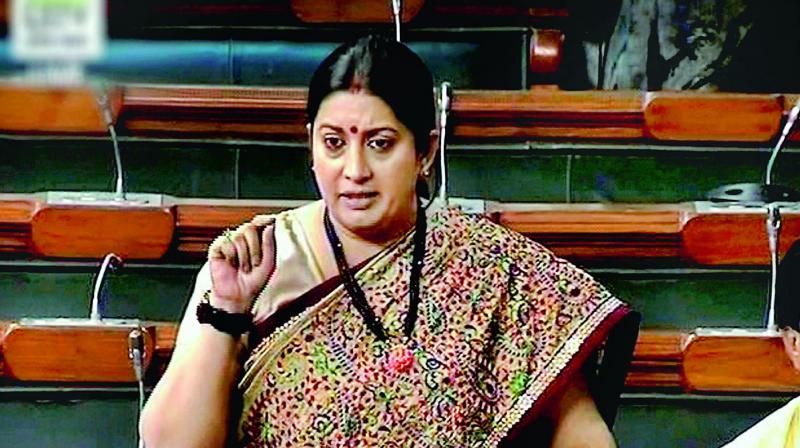Smriti Irani's patriarchy on show?

In a day and age where gender equality is the operative phrase, and women are fighting an age-old gender bias, it is embarrassing to see some women make disparaging comments on men. Recently Smriti Irani, questioned Congress president Rahul Gandhi’s “purusharth” (masculinity) on a day he gave his constituency a miss to take on the Prime Minister Modi in Delhi. The Union minister raised some hackles with her comments that while the BJP president Amit Shah had earned his post on account of his manliness, Rahul had got his rank thanks to his mother’s blessings.
Defining purusharth is tricky. In Sanskrit it means goals of life. The word needs to be seen in context, and if misunderstood, can be insulting, even bigoted. Language is never neutral. The same words mean different things to different people, and everyone is subconsciously filtering words through their own personal biases.
“Indian culture teaches respect, even for opponents. Language must not be used to disrespect, using cultural concepts taken out of context. One should choose words carefully,” says Professor Ananda Balayogi Bhavanani, chairman, International Centre for Yoga Education and Research at Ananda Ashram, Pondicherry.
Sexism isn’t an exclusively male phenomenon but part of a larger cultural discourse in which women also participate. “Purusharth” controversy coming from someone, who has been time and again attacked with sexist comments on social media.
Slamming Smriti Irani, firebrand MP Renuka Chowdhury says, “It is so pathetic that women are so conditioned that we come down so low to injure ourselves only. I wish Smriti would remember that all men are born to women. And speaking of such gender stereotyping, and a clichéd way of thinking, it’s more disappointing that younger people are thinking like this. I have always fought against phrases like ‘chudiya pehne hai’ (he is wearing bangles). I don’t think chudi denotes weakness. It’s only the people who are ‘layak’ are capable of wearing bangles and not everyone can wear it. It’s a symbol of courage. So, I don’t like people talking like that.”
It’s easy, even convenient, to blame men for their blatant misogyny, often considered reflexive and casual, but what explains women being complicit in a cultural construct as problematic as patriarchy? There was a huge hue and cry when Congress MP Sanjay Nirupam had told Smriti Irani, “It is only four days of your entry into politics and you have become a political analyst. Aap toh TV par thumke lagati thi, aaj chunavi vishleshak ban gayi (You used to twerk on television, and now you think of yourself as a political analyst)”
“When men make sexist comments we admonish them. Women too should stop making such sexist remarks. Smriti Irani is not just a politician. She is a role model, and by making such comments she is lowering the dignity of public discourse. The level of political discourse has reached its nadir in recent times. Such comments can only further deteriorate that,” says, poet, painter, journalist Pritish Nandy. In real terms, purushartha means is about the objectives of a human being and is applicable to both men and women equally.
Sampadananda Mishra, Sanskrit scholar and Director, Sri Aurobindo Foundation for Indian Culture, sums up, “Translating purusharth as manhood is a violation, even the common man in India understands that purusharth is not manhood but it’s the very purpose of life, something that applies to both man and woman.”

